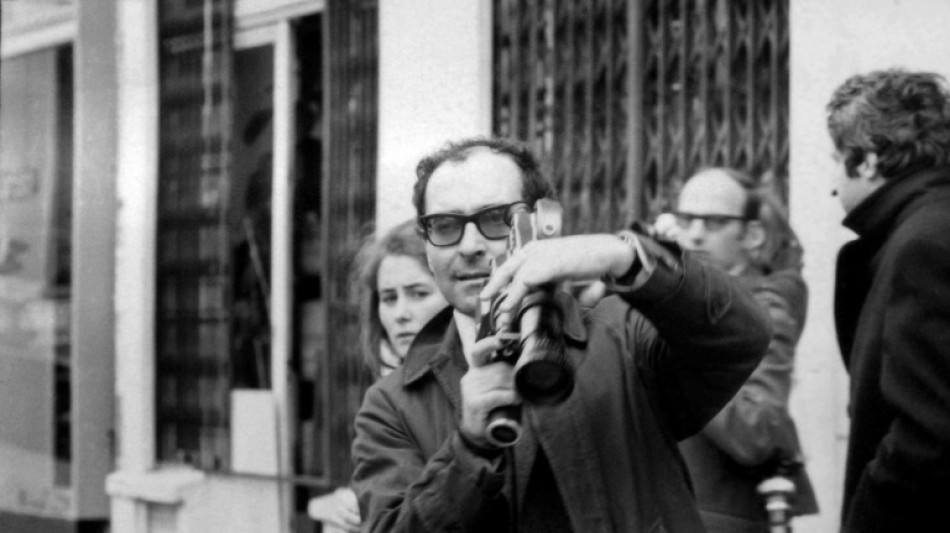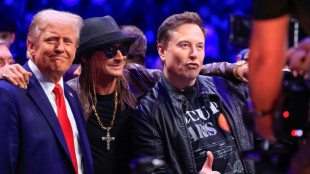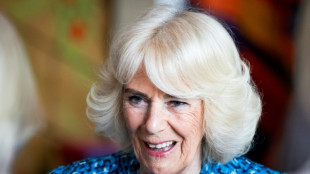
-
 South Korea president clings to power after martial law U-turn
South Korea president clings to power after martial law U-turn
-
Presidential vote seen as referendum on Romania's European future

-
 Hamilton bids farewell to Mercedes as Ferrari vie for title
Hamilton bids farewell to Mercedes as Ferrari vie for title
-
New Zealand unchanged in bid to hit back against England

-
 Macron seeks remedy to France's political crisis
Macron seeks remedy to France's political crisis
-
New Natalia Lafourcade album celebrates music's onstage evolutions

-
 Taiwan's Lai kicks off visit to US territory Guam
Taiwan's Lai kicks off visit to US territory Guam
-
Ivory Coast staple cassava meal gains UNESCO heritage status

-
 OpenAI to partner with military defense tech company
OpenAI to partner with military defense tech company
-
Liverpool held but Slot salutes 'special' Salah

-
 Man City needed to break losing 'routine', says Guardiola
Man City needed to break losing 'routine', says Guardiola
-
Leipzig down Frankfurt to reach German Cup quarters, Cologne strike late

-
 Mbappe admits penalty miss 'big mistake' as Bilbao beat Real Madrid
Mbappe admits penalty miss 'big mistake' as Bilbao beat Real Madrid
-
'Sad, disappointed' Mbappe pays penalty as Bilbao beat Real Madrid

-
 US stocks surge to records, shrugging off upheaval in South Korea, France
US stocks surge to records, shrugging off upheaval in South Korea, France
-
Liverpool held in Newcastle thriller, Arsenal inflict Amorim's first defeat

-
 Shiffrin confirms she'll miss Beaver Creek World Cup races
Shiffrin confirms she'll miss Beaver Creek World Cup races
-
Corner kings Arsenal beat Man Utd to close gap on Liverpool

-
 Mbappe pays penalty as Bilbao beat Real Madrid
Mbappe pays penalty as Bilbao beat Real Madrid
-
NFL Jaguars place Lawrence on injured reserve with concussion

-
 North Korea, Russia defence treaty comes into force
North Korea, Russia defence treaty comes into force
-
Openda hits brace as Leipzig beat Frankfurt in German Cup last 16

-
 Schar punishes Kelleher blunder as Newcastle hold Liverpool in thriller
Schar punishes Kelleher blunder as Newcastle hold Liverpool in thriller
-
De Bruyne masterclass helps Man City end seven-game winless streak

-
 Syrian rebels surround Hama 'from three sides', monitor says
Syrian rebels surround Hama 'from three sides', monitor says
-
Lawyers seek leniency for France rape trial defendants, blaming 'wolf' husband

-
 OpenAI chief 'believes' Musk will not abuse government power
OpenAI chief 'believes' Musk will not abuse government power
-
Thousands rally in Georgia after police raid opposition offices

-
 S. Korea opposition push to impeach president
S. Korea opposition push to impeach president
-
Powell 'not concerned' US Fed would lose independence under Trump

-
 French government falls in historic no-confidence vote
French government falls in historic no-confidence vote
-
Syrian White Helmets chief 'dreams' of never pulling a body out of rubble again

-
 NBA Suns lose Durant for at least a week with ankle injury
NBA Suns lose Durant for at least a week with ankle injury
-
Warhammer maker Games Workshop enters London's top stocks index

-
 Iran Nobel winner released for three weeks, 'unconditional' freedom urged
Iran Nobel winner released for three weeks, 'unconditional' freedom urged
-
Red Cross marks record numbers of humanitarians killed in 2024

-
 Johnson's Grand Slam 'no threat', says World Athletics boss Coe
Johnson's Grand Slam 'no threat', says World Athletics boss Coe
-
Qatar's emir and UK's Starmer talk trade as state visit ends

-
 Cuba suffers third nationwide blackout in two months
Cuba suffers third nationwide blackout in two months
-
Russia, Ukraine to send top diplomats to OSCE summit in Malta

-
 Spanish royals to attend memorial service for flood victims
Spanish royals to attend memorial service for flood victims
-
LPGA, USGA new policy requires female at birth or pre-puberty change

-
 Stick to current climate change laws, US tells top UN court
Stick to current climate change laws, US tells top UN court
-
British Museum chief says Marbles deal with Greece 'some distance' away

-
 Pope Francis receives electric popemobile from Mercedes
Pope Francis receives electric popemobile from Mercedes
-
Gaza civil defence: thousands flee Israeli strikes, evacuation calls

-
 Trump names billionaire private astronaut as next NASA chief
Trump names billionaire private astronaut as next NASA chief
-
Pidcock to leave INEOS Grenadiers at end of season

-
 Seoul stocks weaken, Paris advances despite political turmoil
Seoul stocks weaken, Paris advances despite political turmoil
-
South America summit hopes to seal 'historic' trade deal with EU


Godard, film rebel without a pause
Jean-Luc Godard -- who has died at 91 -- was the rebel spirit who drove the French New Wave, firing out a volley of films in the 1960s that rewrote the rules of cinema.
Between "Breathless" ("A Bout de Souffle") in 1960 and the student protests of 1968, Godard exhilarated audiences as he shook the film world with his technical innovations and savage, occasionally lyrical, satires.
Sometimes working on two movies at the same time, he ranged over crime, politics and prostitution in a burst of creative energy that would inspire two generations of directors.
Godard's witty aphorisms like "a story should have a beginning, a middle and an end -- but not necessarily in that order", became lodestars for filmmakers from Robert Altman and Martin Scorsese to Quentin Tarantino and Paul Thomas Anderson.
But the flame that had burned so bright in the 1960s veered off into revolutionary politics and Maoist obscurantism in the 1970s, and he came to be seen almost as a tragicomic figure.
Godard spent several years experimenting with video before returning to commercial filmmaking -- of a kind -- in 1979.
- Modern prophet -
But the freshness was gone and critics accused him of becoming too elliptical, with some branding his early films misogynist.
Yet the increasingly reclusive Godard persevered down his singular path, before reinventing himself in his later years as a gnomic cigar-chomping prophet.
He shot his critically acclaimed "Film Socialisme" on board the Costa Concordia cruise ship in 2009, declaring that capitalism was heading for the rocks. When the ship ran aground three years later, it wasn't just his small band of disciples who treated him as a visionary.
Born in Paris into a well-to-do Franco-Swiss family on December 3, 1930, Godard was lucky enough to spend World War II at Nyons in neutral Switzerland, returning to the French capital in 1949 to study ethnology at the Sorbonne.
But his real education was in the little cinemas of the Latin Quarter where he first ran into Francois Truffaut, Jacques Rivette and Eric Rohmer, all future luminaries of the French cinema.
He fell in love with American action cinema and began writing criticism under the pseudonym "Hans Lucas" with Truffaut, Rivette and Rohmer for small magazines like the "Cahiers du Cinema", where they plotted to revolutionise the art.
After a failed attempt to make his first film in America, he went to work on a dam in Switzerland and saved enough money to make a film about it, "Operation Concrete" (1954).
It helped lay the foundation for his rapid ascent that would see him hailed as the leader of the French New Wave when "Breathless" was released in 1960.
- 'The Picasso of cinema' -
That swaggering story of a small-time crook on the run who romances a young American in Paris was a major landmark in French cinema, heralding the arrival of a generation of irreverent young film-makers determined to break with the past.
So big was its impact that Truffaut called Godard cinema's Picasso, someone who had "sown chaos... and made everything possible". As often with Godard, their friendship later turned sour, with Truffaut branding him a "shit" after the pair fell out in 1973.
By shooting on the fly in outdoor locations and improvising endlessly, Godard rewrote the rulebook and helped popularise the idea of the director as "auteur", the creative force behind everything on the screen.
"Breathless" also gave the first big break to Jean-Paul Belmondo, who would later star in Godard's masterpiece and most personal film "Pierrot le Fou" (1965), which explored the pain of his break-up with the Danish actress Anna Karina.
From the start, Godard's career was dogged by controversy. "Le Petit Soldat" (1960), with its references to the Algerian war, was banned by the French authorities for three years and "Une Femme Mariee" (A married woman, 1964) had its title changed from "La Femme Mariee" by censors concerned that its adulterous heroine might be taken for the typical French wife.
But after "Weekend" (1967), a gory examination of the obsession with cars scattered with surrealistic traffic accidents, his work too often appeared self-indulgent.
Indeed, Godard became something of an intellectual oddity, emerging every few years from his bolthole in Rolle on the shores of Lake Geneva to lob a verbal grenade or two.
It was this tragic, cartoonish Godard on the slide who features in "Godard Mon Amour", the 2017 comedy about him by Michel Hazanavicius, the Oscar-winning maker of "The Artist".
But by then Godard was having the last laugh, with his reputation somewhat restored by a series of low-budget metaphorical films that questioned our image-saturated world.
"Film is over," he told The Guardian in a rare interview in 2011, recanting his oft-quoted maxim that "photography is truth, and the cinema is truth 24 times per second".
"With mobile phones, everyone is now an auteur," he said.
D.Schneider--BTB


